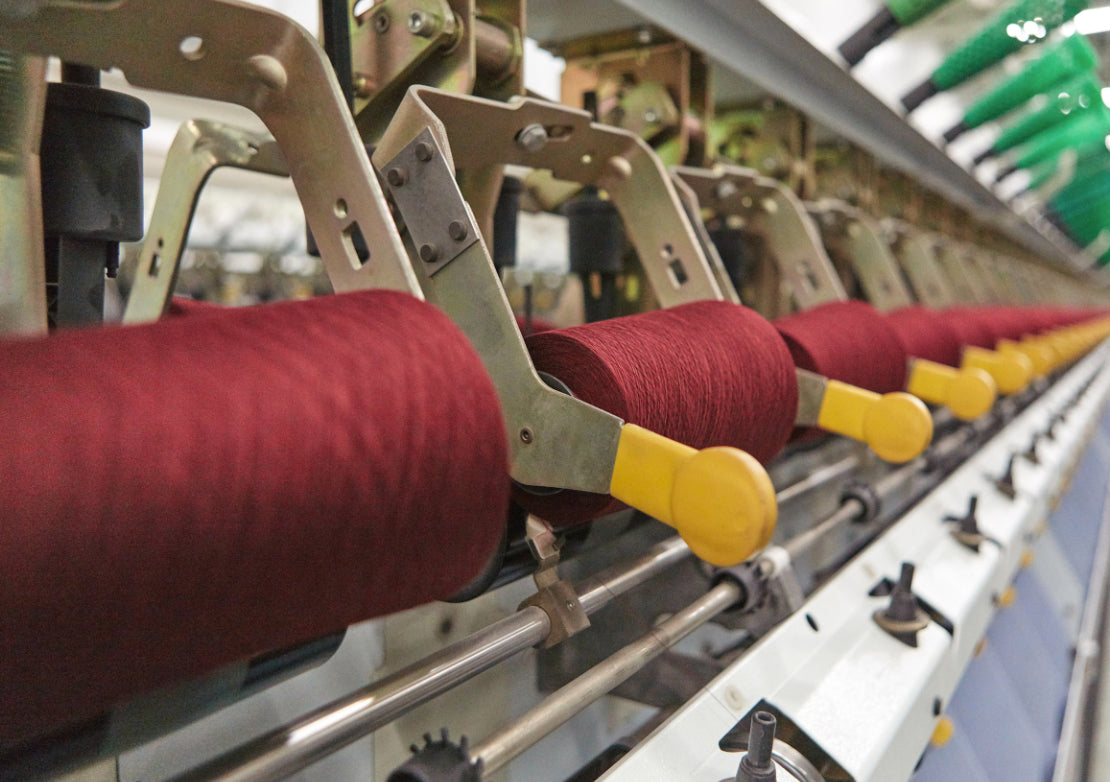Whilst being selective about our fabric choices at Saywood, the process of production is also really important to us, as the process has a huge impact on the sustainability of the product and consumption of resources. Our red check cotton cloth, used in our Jules shirt and Etta dress, was sourced from Riopele in Portugal, from deadstock. Riopele are a fabric mill improving on their production processes in a big way.
Consciously Certified
Riopele has made big strides on reducing their energy use, water consumption and creating highly improved chemical management. So much so, that in 2019, Riopele became certified by STeP by OEKO-TEX® - Sustainable Textile Production.

This certification confirms that Riopele has permanently implemented environmentally-friendly production processes, as well as safe, healthy and socially acceptable working conditions. They were assigned level 3, the highest level, meeting the ‘Ideal implementation in the sense of Best Practice examples’.
The STeP certification is provided when a participant has shown responsibility in the entire production chain, rather than just individual sustainability aspects. There are 6 key areas to determine STeP:
- Chemical management
- Environmental performance
- Environmental management
- Social responsibility
- Quality management
- Health protection and safety at work

Fabric being Woven on the Weaving Machine.
The Process
Riopele’s commitment to more environmentally friendly production processes have meant they have been able to recycle 55% of the water used in processing the cloth, which is a significant amount. As well as having their own water treatment and pre-treatment plant, they have achieved this through investment in new machinery and equipment, meaning not only is water usage reduced, but also energy, as the machinery has better heat recovery systems and higher energy efficiency. For example, the use of low liquor dying equipment, means shorter dye baths, for both yarn dying (for example checks and stripes) and piece dying (plains), and less water is required per weight of cloth during the dying process.

Riopele has reduced their use of water and chemical consumption drastically.

Riopele's Solar Park providing them with photovoltic power.
As well as new machinery, Riopele have installed a photovoltaic power plant (solar cell panels) in one of their spinning mills, contributing to a reduction of their CO2 emissions by 689 tons per year. And they have replaced their lighting with LED lighting systems, along with their auxiliary vehicles being replaced with electric ones. These changes add up to a major conversion for a fabric mill.
And they haven’t stopped there. Riopele have reduced the chemical consumption across their production, and are working with a selection of finishing products that are not harmful to both human and environmental health.
 Riopele have achieved a higher level of energy efficiency and reduced their energy consumption needs.
Riopele have achieved a higher level of energy efficiency and reduced their energy consumption needs.
Products
When it comes to more sustainable materials, Riopele is committed. They are increasing the use of recycled materials like Recycled Polyester of Repreve by Unifi, as well the use of Lyocell Refibra by Lenzing - made from recycled pre- and post-consumer goods -, going full circle.

Riopele are using certified, recycled and responsibly sourced fibres for their materials.
Where the materials are new, they are responsibly sourced from managed forestry with regards to their Lyocell Tencel, Viscose EcoVero by Lenzing, and Acetate Naia by Eastman. Riopele is also certified by Organic Content Standard and is a member of Better Cotton Initiative (BCI), a project of teaching better farming techniques so as to use fewer pesticides and reduce water and farming resources, through better knowledge of harvesting and feed times. Their cotton is sourced only from countries that have high levels of ethical requirements.

Yarn cones lined up during weaving.
Social
As a company Riopele has established good working conditions in all business area. They have an Ethical Conduct Committee to support their workers, as well as offering free access to a medical and nursing team on site at their facilities. And offer a respectful and secure work environment with proper remuneration for their workers, inclusive of any overtime.
Riopele also has a positive social impact on the community. They have installed a business incubator in their facilities, fostering entrepreneurship, and they have ceded Riopele’s sports complex to a local football team, enabling over 200 training athletes, as well as school and other local associations, to enjoy excellent sport conditions.
The future
But Riopele are not stopping there. They are still working towards a more sustainable future, with the aim to increase their transparency and traceability in their supply chain mapping, reduce the impact of their product packaging, continue to improve upon their energy management systems and the life cycle of their products.

Yarn cones after they have been through the dying process.




